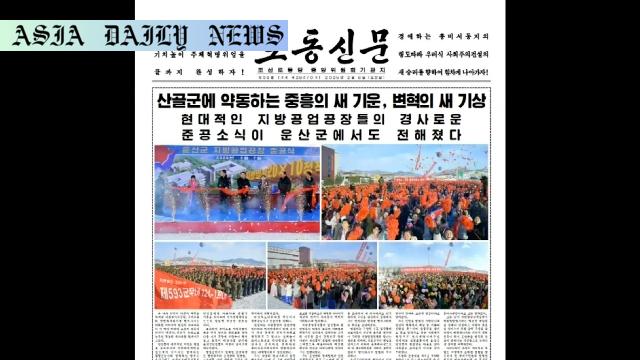Nuclear Weapons: North Korea’s state media declares nuclear arsenal is for real war, not a ‘bargaining chip’ for negotiation.
- North Korea states its nuclear weapons are for real war, not for negotiations.
- Pyongyang rejects the concept of denuclearization talks as outdated.
- North Korea views its arsenal as essential for protecting sovereignty.

Introduction: Evolving Nuclear Stance
North Korea continues to double down on its defense of retaining nuclear weapons, a subject of immense global concern. The state-run Korean Central News Agency (KCNA) has clarified that Pyongyang views its nuclear arsenal as a sovereign guarantee against threats, rather than a strategic tool for negotiation. This announcement has not only raised tensions but also highlighted the evolving strategy of the North regarding its nuclear policies.
The Rigidity of North Korea’s Position
The latest statement from KCNA explicitly counters calls from NATO and EU officials for the complete, verifiable, and irreversible denuclearization of North Korea. Describing “denuclearization” as an antiquated concept, North Korea has signaled its unwillingness to even entertain such discussions. This marks a significant shift, especially given past instances where diplomacy seemed like a potential path, albeit a challenging one. The country instead views nuclear forces as “immutable,” necessary for “real war,” and essential to preserving its sovereignty.
Rejection of Nuclear Bargaining
KCNA emphasized that the country’s nuclear arms are neither a bargaining chip nor a means to gain recognition. According to the commentary, the arsenal is not a tool for economic negotiation, nor a superficial advertisement. Instead, it asserts that these weapons are strategic and existential safeguards against external threats. This rhetoric echoes earlier policies voiced by Kim Jong Un but appears to have grown stronger in tone and intent.
Global Reactions and Implications
The global community, particularly NATO and the EU, remains committed to achieving a denuclearized Korean Peninsula. However, Pyongyang’s defiance presents a significant roadblock. South Korea’s Yonhap News Agency observed that North Korea now appears to treat the topic of denuclearization as irrelevant for future discussions. This poses a massive challenge to international efforts to diffuse the crisis diplomatically.
Meanwhile, US President Donald Trump previously expressed some willingness to hold dialogues with North Korean Supreme Leader Kim Jong Un. However, Trump’s symbolic gestures, including historic face-to-face meetings, have yet to produce lasting results. As North Korea strengthens its stance, the efficacy and future of such diplomatic efforts remain uncertain.
The Sovereignty Argument
For North Korea, the idea of sovereignty is inextricably tied to its nuclear capability. The country views its weapons as a shield against any external attempts to undermine its self-governance or threaten its survival. This perception is amplified by historical factors, including past tensions with the United States, perceived hostilities from South Korea, and isolation from global platforms. The existing stance suggests that denuclearization, from Pyongyang’s perspective, equals vulnerability.
Regional and Global Dynamics
The impact of Pyongyang’s nuclear policies extends far beyond the Korean Peninsula. In the broader Asia-Pacific region, North Korea’s nuclear advancements have spurred neighboring nations, such as Japan and South Korea, to strengthen their defense strategies. The United States’ military presence in the region and China’s strategic interests further complicate the geopolitical landscape.
Globally, North Korea’s defiance exacerbates tensions with leading powers, intensifies non-proliferation debates, and challenges the credibility of organizations such as the United Nations Security Council. While sanctions and diplomatic pressure continue, the effectiveness of these tools remains under scrutiny.
Conclusion: An Uncertain Future
North Korea’s staunch assertion that its nuclear arsenal is “not a bargaining chip” symbolizes a deeply entrenched strategy. By rejecting denuclearization and insisting on the existential need for nuclear forces, Pyongyang is reconfirming its non-negotiable stance. As tensions rise, the pathway to de-escalation seems fraught with challenges. The global community must navigate these turbulent waters with a mix of strategic creativity and patience.



Commentary
Understanding the Core of North Korea’s Nuclear Policy
North Korea’s firm declaration that its nuclear arsenal is not a “bargaining chip” provides critical insight into its strategic mindset. By framing its nuclear weapons as vital for preserving sovereignty and defending against external threats, Pyongyang signals its deep-rooted apprehensions and its unwillingness to engage in traditional denuclearization dialogues. This perspective reflects not only North Korea’s current geopolitical calculations but also the impact of its historical experiences.
A Shift Beyond Diplomacy
Historically, nuclear programs often serve dual purposes—deterrence and leverage. However, North Korea’s insistence on retaining its arsenal signals a departure from the latter. This approach presents a formidable challenge for global diplomacy. Conventional strategies, such as sanctions or incentives, may prove ineffective if Pyongyang views its nuclear weapons as non-negotiable. The international community must now consider alternative means of engaging North Korea while addressing regional security concerns.
The Role of Sovereignty
At the heart of North Korea’s position lies a fundamental emphasis on sovereignty. For Pyongyang, maintaining a nuclear arsenal is not simply about military capability but about reinforcing national identity and independence. This narrative is key to understanding North Korea’s resistance to external pressures. For global actors, this underscores the importance of addressing North Korea’s security and sovereignty concerns in crafting strategies aimed at reducing nuclear proliferation.
Moving Forward
While North Korea’s stark refusal to use its nuclear weapons as a bargaining chip intensifies challenges, it also calls for a reassessment of existing approaches. Diplomatic efforts must evolve, focusing on building trust and incremental gains rather than seeking rapid, unilateral disarmament. Engagement must be multifaceted, balancing security interests with economic and humanitarian considerations to foster dialogue and reduce hostility.